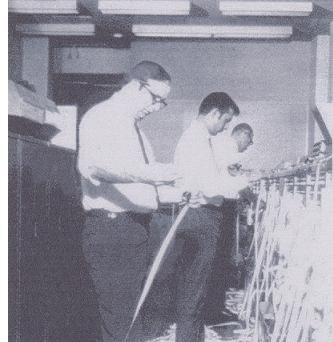By Ben Blodget, W1VEH

One of the retirees of the Diplomatic Communications Service (DTS) found this picture of message handling before the computer age. This is what we used to do:
Messages were type up on tape in 5-hole Baudot Code representing a letter or number. Incoming messages were received by radio-teletype and punched out in a bank of "Reperforators" shown above. Each unit received from an individual station. Shown above is a Signal Center or Relay Point.
Each incoming message had to be scanned manually for errors (a letter or two corrected if possible), torn off and hung at a sending position according to the addressee destination. If the message contained too many garbles, a service message had to be sent for a repeat. A "Transmitter Distributor" pushed the tape through to the outgoing radio circuit. The picture shows a normal situation of tapes pouring in and being handled. Each message was logged in according to its destination and at the end of the day the incoming logs had to be checked against the outgoing logs to ensure that each message had been actually sent on its way. Often it was 0200 or 0300 before the floor was cleared. When distant stations opened up in the morning, another day began.
This was an advancement from all messages being transmitted via International Morse Code, first to 60 WPM, then to 100 WPM teletype machines. The Communications Agency was disbanded in 2000, as being unnecessary due to the highly technical computer systems that evolved which eliminated the need for knowledge of codes, encryption and electronic maintenance ability.
Transmitter distributors (TD) depending on the design, created either chad or chadless tape, tapes that produced chad punched out the whole hole, tapes without chad punched around 3/4 of the diameter of a hole. As you can probably imagine, a chad system created quite a mess. A TD can create and read a tape. Many may remember the hanging, dimpled, or pregnant chad ballot fiasco from the Florida Presidential Election of 2000.
Radioman First Class Bob Roske; USNR Retired (QCWA President)
February 3, 2009